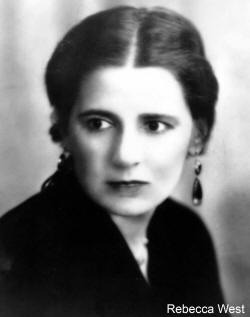

Partner Pamela Frankau
Queer Places:
Orchard Court, 15 Portman Sq, Marylebone, London W1H 6LF,
UK
36 Queen's Gate Terrace, South Kensington, London SW7 5PH, UK
80 Onslow Gardens, London N10 3JX, UK
Brookwood Cemetery, Brookwood, Woking GU24 0BL, UK
 Dame
Cicily Isabel Fairfield
DBE (21 December 1892 – 15 March 1983), known as Rebecca West, or Dame Rebecca West, was a British author, journalist,
literary critic and
travel writer. She had a long but stormy friendship with the author
Pamela Frankau. She was a friend and supporter of
Emma Goldman; she wrote
the preface to Goldman’s My Disillusionment in Russia. When three
veterans of the women's suffrage campaign,
Dora
Marsden,
Grace
Jardine and
Mary
Gawthorpe, began publishing their a feminist journal,
The Freewoman on 23rd November, 1911, Rebecca West wrote an article
in support for
free-love for its first edition: "Marriage had certain commercial
advantages. By it the man secures the exclusive right to the woman's body and
by it, the woman binds the man to support her during the rest of her life... a
more disgraceful bargain was never struck."
Rebecca West was a close friend of Helen Archdale,
Cicely Hamilton,
Vera Brittain,
Margaret Rhondda,
Winifred Holtby
and Sylvia Lynd. She had a rivalry with
Elizabeth Robins.
Dame
Cicily Isabel Fairfield
DBE (21 December 1892 – 15 March 1983), known as Rebecca West, or Dame Rebecca West, was a British author, journalist,
literary critic and
travel writer. She had a long but stormy friendship with the author
Pamela Frankau. She was a friend and supporter of
Emma Goldman; she wrote
the preface to Goldman’s My Disillusionment in Russia. When three
veterans of the women's suffrage campaign,
Dora
Marsden,
Grace
Jardine and
Mary
Gawthorpe, began publishing their a feminist journal,
The Freewoman on 23rd November, 1911, Rebecca West wrote an article
in support for
free-love for its first edition: "Marriage had certain commercial
advantages. By it the man secures the exclusive right to the woman's body and
by it, the woman binds the man to support her during the rest of her life... a
more disgraceful bargain was never struck."
Rebecca West was a close friend of Helen Archdale,
Cicely Hamilton,
Vera Brittain,
Margaret Rhondda,
Winifred Holtby
and Sylvia Lynd. She had a rivalry with
Elizabeth Robins.
On 16 June 1932, at the Dorchester Hotel on Park Lane, London, a number of British women writers and readers gathered for a Reception given by Time and Tide, the feminist weekly newspaper founded by Lady Margaret Rhondda in 1920. According to a report printed in The Times the next day, among those who had accepted invitations to be present were: Phyllis Bentley, Stella Benson, Vera Brittain, Professor Winifred Cullis, E.M. Delafield, Susan Ertz, Eleanor Farjeon, Cicely Hamilton, Winifred Holtby, Sylvia Lynd, Rose Macaulay, Naomi Mitchison, Edith Shackleton, Rebecca West and Ellen Wilkinson. Years later, Naomi Mitchison described Time and Tide as 'the first avowedly feminist literary journal with any class, in some ways ahead of its time', which in the early 1930s was 'in full flood, with a number of good authors writing for it'.
An author who wrote in many genres, West reviewed books for The Times, the New York Herald Tribune, the Sunday Telegraph, and The New Republic, and she was a correspondent for The Bookman. Her major works include Black Lamb and Grey Falcon (1941), on the history and culture of Yugoslavia; A Train of Powder (1955), her coverage of the Nuremberg trials, published originally in The New Yorker; The Meaning of Treason (1949), later The New Meaning of Treason (1964), a study of the trial of the British fascist William Joyce and others; The Return of the Soldier (1918), a modernist World War I novel; and the "Aubrey trilogy" of autobiographical novels, The Fountain Overflows (1956), This Real Night (published posthumously in 1984), and Cousin Rosamund (1985). Time called her "indisputably the world's number one woman writer" in 1947. She was made CBE in 1949,[1] and DBE in 1959,[2] in each case, the citation reads: "writer and literary critic". She took the pseudonym "Rebecca West" from the rebellious young heroine in Rosmersholm by Henrik Ibsen. She was a recipient of the Benson Medal.
After she was widowed, she moved to London, where she bought a spacious apartment overlooking Hyde Park. Unfortunately, it was next door to the Iranian embassy. During the May 1980 incident, West, then 87, had to be evacuated.[19] In the last two decades of her life, West kept up a very active social life, making friends with Martha Gellhorn, Doris Lessing, Bernard Levin, comedian Frankie Howerd, and film star and director Warren Beatty, who filmed her for the production Reds, a biography of journalist John Reed and his connection with the Russian Revolution. She also spent time with scholars such as Jane Marcus and Bonnie Kime Scott, who began to chronicle her feminist career and varied work.[20] She wrote at an unabated pace, penning masterful reviews for the Sunday Telegraph, publishing her last novel The Birds Fall Down (1966), and overseeing the film version of the story by BBC in 1978. The last work published in her lifetime was 1900 (1982). 1900 explored the last year of Queen Victoria's long reign, which was a watershed in many cultural and political respects.
West suffered from failing eyesight and high blood pressure in the late 1970s, and she became increasingly frail. Her last months were mostly spent in bed, sometimes delirious, sometimes lucid, and she complained that she was dying too slowly.[21] She died on 15 March 1983 and is buried at Brookwood Cemetery, Woking.[22]
My published books: